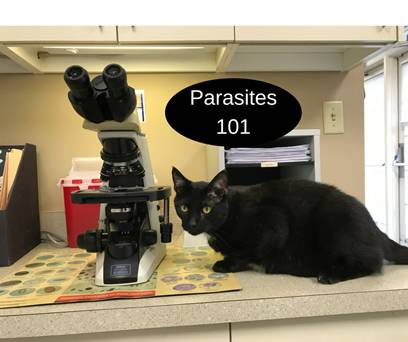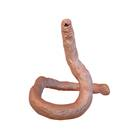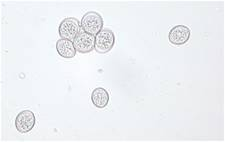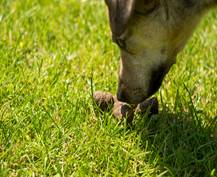How Does My Dog or Cat Get Parasites and Can They be Transmitted to People?

Roundworm

This long spaghetti-like worm is probably the most common worm we see, especially in puppies and kittens, since they can get it easily from their mother and littermates. Almost all puppies and kittens are born with this parasite, even those from good breeders. It is very hard to eliminate from the environment, so breeding animals and young animals are routinely dewormed for this every 2 weeks until at least 8-12 weeks of age. You may see these worms in the stool or vomit before and after deworming. The microscopic eggs are shed in the stool, ingested, and larvae travel through the lungs before reaching maturity. Therefore, they can cause coughing, weight loss, and diarrhea, or they can be present even in stools that look normal. It can take 3 weeks from the time of infection until they worms are mature. Therefore, it is important for your vet to check stool samples on all puppies and kittens, deworm more than once, and to give heartworm preventatives to dogs on schedule. Sentinel and Trifexis help protect against this worm. THIS WORM CAN BE PASSED TO PEOPLE, especially young children who may not practice perfect hygiene. It can be passed to other dogs/cats also.
Hookworm

This is another very common worm in puppies/kittens and for those dogs who are not on monthly heartworm preventative. We rarely see this in animals that are on Sentinel or Trifexis consistently. This worm can cause weight loss, diarrhea, and sometimes bloody stools. It is treatable with many standard dewormers . THIS WORM CAN ALSO BE PASSED TO PEOPLE. The larvae can enter through the skin, so be sure NOT to walk barefoot in the yard, and wash your hands. This is also true for other animals, so other pets in the household may need to be treated.
Giardia

This is another VERY common parasite, especially in puppies and kittens. It can be passed through ingesting stool or drinking contaminated water that has infected cysts shed by another animal. It can be present in normal looking stools, can cause weight loss, diarrhea, and rarely vomiting. Often, it can cause off and on softer stools rather than true diarrhea. Adult animals can harbor the parasite without symptoms. It can be very hard to get rid of, requiring several rounds or different types of dewormers, a few weeks apart. IT CAN RARELY BE PASSED TO PEOPLE, but can be passed to other animals. Bathe animals who have diarrhea on their fur to help prevent reinfection.
Coccidia

This is another fairly common parasite in young animals, although it can cause weight loss and other gastrointestinal symptoms in adults also, including bloody stool. The most common species of coccidia cannot be passed to people, but is contagious to other dogs/cats and requires a special dewormer that is not given routinely, and is not in heartworm preventatives. This parasite can be identified on a routine fecal exam, so be sure to check for this every year.
Tapeworm

There are 2 kinds of tapeworm, but the most common in dogs/cats is caused by ingesting fleas. Routine fecal exams are often normal, but you will see small, white rice-like egg segments in the stool or dried on the fur around the anus/tail. Tapeworm requires a special dewormer. Since transmission requires eating fleas, it is not easily transmissible to people or other animals (unless they have fleas). The other kind of tapeworm requires eating rodents and rabbits. Tapeworm can be avoided by preventing predation and by using a good monthly flea preventative. Treating the tapeworm alone is often not enough, flea control must also be instituted to ensure efficacy.
Whipworm

This is a less common, but still notable parasite, mostly of dogs. It is caused by ingesting infected stool and can cause weight loss, diarrhea, vomiting, and especially bloody diarrhea. It can be present in seemingly normal stool, but can also cause serious systemic disease, anemia, and electrolyte imbalances. It can be very hard to get rid of, requiring several rounds of a powdered dewormer, environmental decontamination, and special monthly heartworm preventatives such as Sentinel. It poses little risk to people, but significant risk to other dogs, often resulting in chronic infection. Be sure to remove stools promptly, check stools at your vet regularly, and limit exposure to other dogs.
If Your Pet Has Intestinal Parasites
Follow These Steps to Decrease the Risk of Your Pet Transmitting the Parasite to You and Reinfection of the Parasite to Your Pet.
Pick up/scoop and dispose of stools immediately, disinfect crates and litter boxes with diluted bleach (1/2 cup bleach to a gallon of water and let sit at least 5 minutes) treat all animals in the house with a dewormer, and use gloves and/or wash your hands thoroughly before touching your eyes, nose, or mouth.
What You Can Do to Help Prevent Parasites in Your Pet
Generally speaking, to prevent most parasites in your pet, try to eliminate ingestion of feces and predatory behavior. Be especially careful in areas frequented by wildlife, such as lakes/creeks/streams, forests, and woodpiles. Remove stools promptly and use good hygiene and clean contaminated surfaces. Treat all pets in the house with year-round monthly flea and heartworm preventatives, as well as any additional dewormers recommended by your veterinarian. If your pet has any symptoms such as weight loss, chronic diarrhea, decreased appetite, vomiting, coughing, etc. please schedule an exam and bring in a fresh stool sample as soon as possible. A tablespoon size stool sample is needed to run fecal exams.
 Discourage Hunting |
 Do Not let Dogs Eat Stool |

Flea, Tick and Heartworm Medications

